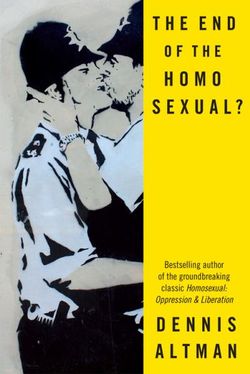

- ISBN:
- 9780702249815
- 9780702249815
- Category:
- Cultural studies
- Format:
- Paperback
- Publication Date:
- 24-07-2013
- Language:
- English
- Publisher:
- University of Queensland Press
- Country of origin:
- Australia
- Pages:
- 256
- Dimensions (mm):
- 226x152x19mm
- Weight:
- 0.34kg
Click 'Notify Me' to get an email alert when this item becomes available
Click on Save to My Library / Lists
Click on My Library / My Lists and I will take you there
You can find this item in:
Reviews
1 Review
Altman asks a single core question in this book: Do we still have need for an identity based on sexuality?
In his seminal 1971 Homosexual: Oppression & Liberation, foretold the coming of polymorphous perversity time when people would be free of labels around their sex lives.
He starts End of the Homosexual with a step back in time, looking at the world before gay liberation. He asks in one chapter, What has changed? What remains the same?
The next section covers the Triumph and Tragedy period of gay history. The years following Stonewall, when for the first time gay was affirmed as good. The sidelining and segregation of women by the gay male community. The devastation of HIV/AIDS and how it rewrote the rules of the game. The rise of queer theory in the 1990s. The globalisation of the gay identity and the tropes that make it up.
The last section looks at what the world is like today. Is normalisation a good thing? Is same sex marriage a good thing? These are important questions because only a short time ago being non-mainstream and having the freedom to invent our own rules was part of the gay identity.
I read Homosexual in 1995 when I was 19, taking Dennis Altmans Gender Politics subject at La Trobe University. A year before, I made an awkward attempt to come out to him after spending four years in a Christian cult.
In the years since, as Ive seen the world become more accepting and sexual identity more fluid, Ive remembered Altmans discussion of polymorphous perversity. The full extent of it didnt hit home until I met my partner last year. If you had to give him a label, hed pick pansexual. He rarely finds men attractive; he notices women every day. He chooses to be in a monogamous relationship with me because of my personality. Its always a challenge explaining our relationship to outsiders, especially gay men.
What makes Altman so appealing is his humility. Hes contributed so much to the development of the LGBTIQ communities, yet in this book hes willing to re-evaluate his earlier thinking. He asks new questions that matter.
This book is my must-read LGBTIQ book for 2013 and I think it will become another classic.


Share This Book: